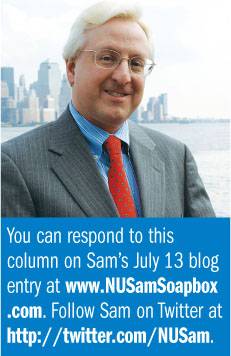I just got back from a vacation in Las Vegas, and even though I am not a big gambler, it's hard to forget the sights and sounds of the casinos. Maybe that's why I heard slot machine bells gleefully chiming as the insurance industry hit the proverbial jackpot with the final version of financial services regulatory reform legislation.
Sure, there are some disappointments for a select few within the business. Those who wanted a much stronger federal role in negotiating trade treaties involving insurance rolled snake eyes. And those who bet an optional federal charter could somehow be slipped into the bill early on lost their shirts as well.
However, you can't call this a total loss, since a great many insurers and agents were betting that Washington would be restrained in its ability to usurp state authority–both in terms of direct regulation of insurance, as well as in striking international deals. 
Indeed, for those opposed to federal intervention, both of these key developments were considered big wins.
Whenever a disaster happens–whether it's the Gulf oil spill, 9/11 or our recent financial meltdown–the government feels obligated to take dramatic action. Often, regulatory "reform" is quite appropriate, as it is in this instance. (Does anyone think banks should remain free to write reckless subprime loans, securitize and pass these bad debts onto clueless investors, and then see naked credit default swaps issued to "insure" these toxic securities?)
However, the danger is that such "reform" crusades become fishing expeditions, in which unrelated activities and entire industries that had nothing to do with the original problem get hit with new regulations.
That was the fear of property and casualty insurers–that they would be taxed, restricted and "reformed" when in fact they were not involved with the systemic problems that crippled and nearly destroyed our economy.
But as it turned out, there is actually a lot to like about the financial services regulatory reform bill, if you are a p&c insurer, agent or broker.
You are no doubt jumping for joy if you are part of the excess and surplus lines market. While regulation will remain at the state level, uniformity will be established to help make multistate placements much less complicated. This will impact diligent search requirements, premium tax allocations and eligibility standards. Similarly, regulation of the reinsurance market will be streamlined.
State regulators are doing victory laps as well because they won't be usurped by Uncle Sam. The National Association of Insurance Commissioners gave the bill a rave review, mostly because the newly created Federal Insurance Office will serve primarily as an information provider. Insurers and agents who prefer continued state oversight are also quite pleased by this turn of events.
The bill does commission the FIO to study insurance regulation and report back to Congress in 18 months. But absent a major crisis, it is doubtful significant changes will be made.
Meanwhile, states can continue to wall off sound insurers from their troubled holding companies if problems not related to insurance arise.
Big insurers were also concerned they were going to be hit with a fee or tax to pre-finance a resolution fund for systemically-risky institutions that run into trouble, but that provision was removed.
The only concern now is whether the new law will do what it's designed to do–keep the economy from running off a cliff again. The odds are pretty good it will.
What do you folks think?
Sam Friedman
Editor In Chief
You can respond to this column on Sam's July 13 blog entry at www.NUSamSoapbox.com. Follow Sam on Twitter at http://twitter.com/NUSam.
Want to continue reading?
Become a Free PropertyCasualty360 Digital Reader
Your access to unlimited PropertyCasualty360 content isn’t changing.
Once you are an ALM digital member, you’ll receive:
- Breaking insurance news and analysis, on-site and via our newsletters and custom alerts
- Weekly Insurance Speak podcast featuring exclusive interviews with industry leaders
- Educational webcasts, white papers, and ebooks from industry thought leaders
- Critical converage of the employee benefits and financial advisory markets on our other ALM sites, BenefitsPRO and ThinkAdvisor
Already have an account? Sign In Now
© 2025 ALM Global, LLC, All Rights Reserved. Request academic re-use from www.copyright.com. All other uses, submit a request to [email protected]. For more information visit Asset & Logo Licensing.








